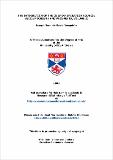Files in this item
The integration of the Gulf Co-Operation Council (GCC): problems and prospects
Item metadata
| dc.contributor.advisor | Malek, M. (Mo) | |
| dc.contributor.author | Rasquinha, Joseph Dominic-Savio | |
| dc.coverage.spatial | 316 | en_US |
| dc.date.accessioned | 2012-06-12T15:30:51Z | |
| dc.date.available | 2012-06-12T15:30:51Z | |
| dc.date.issued | 1992 | |
| dc.identifier.uri | https://hdl.handle.net/10023/2754 | |
| dc.description.abstract | The formation of the Gulf Co-operation Council (GCC) in 1981 was perceived by most observers to be a collective security response to the Iran-Iraq war. Despite this view, the group has endured ten years of integration in a turbulent region and has survived: external threats to its sovereignty, Islamic fundamentalism, the decline of oil prices, internal unrest, attempted coups, and the invasion and occupation of a constituent member. This poses the question: has the integration of these countries proved to be a success? This thesis attempts to answer this question with the aid of a three dimensional analysis. The first dimension examines the theory and practice of integration. Its primary objective is to provide an insight into integration. As the GCC can, at best, be categorised as a Customs Union, this chapter concentrates on Free Trade Areas and Customs Union theories and explores their relationships with tariffs, protectionism, developing countries, and politics. A review of the empirical analyses in the field is essential due to the fact that a mathematical technique is applied to GCC trade in the latter part of this thesis. The existence of political, economic and manpower factors are found to be more detrimental to the GCC's interests than its adherence or convergence to the theory and practice of integration. An analysis of these three factors constitutes the second dimension of the thesis. This commences by examining the Islamic antecedents of the member countries, pan-Islamism and nationalism in the 19th century, and Middle Eastern efforts at integration from the decline of the Ottoman Empire to the present. The establishment of the existing GCC nations and an examination of their natural resources, demography, industry, infrastructure, agriculture, and fisheries is covered, as is the impact of the 1990-91 occupation of Kuwait and the BCCI liquidation. A review of manpower factors includes an examination of the labour market in the pre and post 1973 period with emphasis given to the role of expatriate and indigenous labour. In addition, the influence of education, women in the workforce, nationality, and residence policies on indigenous labour is discussed. The third dimension reviews the prospects of the GCC. This is performed through the construction and utilisation of matrices which examine the similarity or dissimilarity of GCC trade to the World, Developed and Developing Countries. United Nations Standard Industrial Trade Category (SITC) data up to 3-digits, has been used to construct twenty seven 22 x 22 matrices. Nine of these matrices indicate GCC trade with the Rest of the World and are linked to economic and financial literature on the Gulf in order to examine their credibility. Eighteen matrices which indicate trade with the Developing and Developed World indentify potential trade creation, trade diversion and prospects. It is the conclusion of the thesis that the GCC has not succeeded in its integration efforts. The lack of co-ordination to perform as a single unit in economic, political, and military areas, the undemocratic political systems, the exploitation of expatriate labour, the segregation of indigenous labour, and most importantly, the wasted opportunities indicated by the matrices of greater trade creation with the Developed and Developing Countries contribute significantly to the ineffectiveness of the group. | en_US |
| dc.language.iso | en | en_US |
| dc.publisher | University of St Andrews | |
| dc.rights | Creative Commons Attribution-NonCommercial-NoDerivs 3.0 Unported | |
| dc.rights.uri | http://creativecommons.org/licenses/by-nc-nd/3.0/ | |
| dc.subject.lcc | DS326.R2 | |
| dc.subject.lcsh | Persian Gulf Region--Politics and government | en_US |
| dc.subject.lcsh | Persian Gulf Region--Strategic aspects | en_US |
| dc.title | The integration of the Gulf Co-Operation Council (GCC): problems and prospects | en_US |
| dc.type | Thesis | en_US |
| dc.type.qualificationlevel | Doctoral | en_US |
| dc.type.qualificationname | PhD Doctor of Philosophy | en_US |
| dc.publisher.institution | The University of St Andrews | en_US |
This item appears in the following Collection(s)
Except where otherwise noted within the work, this item's licence for re-use is described as Creative Commons Attribution-NonCommercial-NoDerivs 3.0 Unported
Items in the St Andrews Research Repository are protected by copyright, with all rights reserved, unless otherwise indicated.



